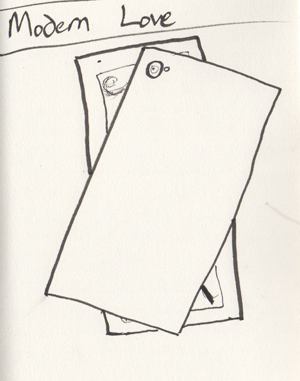A Complete Openness Of Data
It was the tradition now. To go along with those old markers of commitment – engagement rings, joint bank accounts, borrowed clothes, shared rent – there was this opening up of your data to each other, all the things you had said and done and seen and been, all the way back to the beginning of time (2007). There was no deeper symbol of your trust, no greater intimacy in your relationship, than this limitless mingling of information.
Anna and Oya laid their phones on top of each other and between them they shared everything.
The Confluence Of Interests
Anna liked the lists best, tracking the overlap of their histories in the books they’d read, the shows they’d watched, the songs they’d listened to, the games they had played, patterns they’d knitted, topics studied, recipes cooked, links shared. She spent whole days, entire weeks comparing their pasts, revisiting barely remembered childhood obsessions, re-discovering old favourites that she never knew they both loved.
But alongside the joys there was a lingering feeling of fear, a persistent atmosphere of dread. Who knew what opinions Oya had kept hidden behind that stoic facade of hers all these years. Anna couldn’t decide which was going to be worse when it finally happened – discovering Oya hated the things Anna loved unconditionally, or discovering Oya loved those things Anna hated more than anything she could imagine.
They Had Lived Their Lives On Average 1721 Miles Apart
Oya was obsessed with the maps of their lives. At first she jumped from moment to moment – where was Anna when I was here or here or here – but then she let the whole thing play out, the two of them watching the screen together as time lapse journeys traced across the globe, twisting and turning lines recording their passage through time against the surface of the Earth, every minute of their lives mapped to the very inch of the globe.
The first line was Anna’s, then Oya’s blinked into existence moments later. These lines didn’t start when they were born, of course, but from the moments they got their first phones, half a continent away and ten months apart. The map zoomed in from the world view, until only Europe remained, Anna on the left, near the top, Oya on the right, near the bottom, the two lines still so far away it was impossible to think they could ever possibly meet.
Then a sudden jump in scale, down and down, Oya now in the city, Anna in the town, still never having met, but close. So close. There were tantalising moments here and there of near convergence, occasional day trips or holidays bringing them closer to each other, then further apart again. Teenagers now, oblivious of each other’s existence, yet here they were on tubes passing in the dark, in clubs on nearby streets, their breath catching as the map zoomed in further and further, their lines so close now they only needed to show a single street, a single room.
On opposite sides of a stadium, two rows apart in the cinema, side by side in the queue at the bar, waiting for the last bus at the same stop, their dots overlaid on each other as they sat in their seats, Oya downstairs, Anna upstairs, but for a moment looking as if they were sat in each other’s laps.
A pause, for dreams of what might have been.
Had they seen each other? Had they spoken? Were they already in each other’s phones somewhere, before they had even met? The back of a head in a photo, a voice in the background of a call, allusions to each other in social media posts, their identities lost in the noise of fifteen years of accumulated data, hidden in memories unrecoverable even by algorithm.
Then finally here we are, the lines converging towards the town, towards each other. Not just day trips and nights out bringing them coincidentally close any more, but a more permanent swirling in together, getting closer in steps as the choices of their lives draw them inexorably towards each other. The same town, the same places, the same friends. The same house, the same room. The same bed. Every moment of their lives leading them here, to each other, to this moment, this very second, the lines as close now as they could possibly be.
And on the screen things slow, seem to stop. From here on out, those lines would have to move in real time. They had lived their lives on average 1721 miles apart. How long would it take them, Oya wondered, to get that down to zero.
___________
Notes:
1. Written between June 5th and June 7th, 2021
2. Although it’s based on a story I started but never finished
3. And also lost entirely at some point
4. From 10 or 15 years ago or something
5. Back when this might have been science fiction
6. Rather than science supposition
